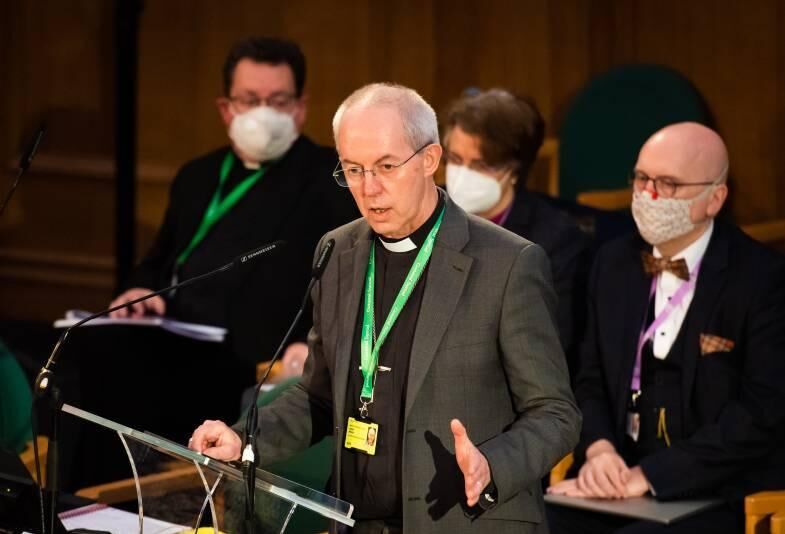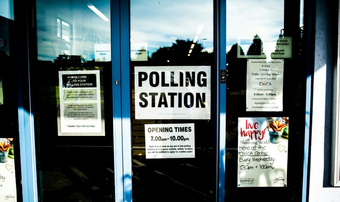The C of E has forgotten its better story about sex

It’s not every day your sex life (or rather, your lack thereof) is discussed in front of the Archbishop of Canterbury...
Yes, for those who were keeping a close eye on the debates at the Church of England’s General Synod this week, I am the fiancé mentioned by ‘London – 354’ (Sophie Clarke, a former graduate of the CARE Leadership Programme!) in her maiden speech on Thursday morning. (And yes, I really did sit through the whole debate for 8 hours across 2 days).
The context for the big debate in the General Synod this week was the presentation of ‘prayers of blessing’ for same-sex couples in the Church of England, after the conclusion of the Living in Love and Faith project.
Recognising that this would be a step too far for many conservatives in the C of E, the bishops had been at pains to stress various bits in the small-print: for instance, they said the prayers of blessing are to bless the people, not the relationship, although their content would suggest otherwise. They also said that doctrine hasn’t officially changed, but many people (particularly around the world) won’t be able to distinguish the difference between pronouncing blessings and a marriage service, and the waters are muddied at best.
Many powerful speeches were made, pointing out a variety of difficulties with what the bishops had put forward (which didn’t particularly please anyone, including those who wish to change church doctrine); I’d particularly commend those of Vaughan Roberts, Anna de Castro and Laura Oliver.
The thrust of Sophie’s speech was directed at a particular problem the bishops have brought about: they have now decoupled sex from marriage for everyone: this is particularly reflected in their response ‘about identity, sexuality, relationships and marriage.’ They wrote on page 8:
“For many years the church has taught that the only rightful place for sexual activity is marriage. There is disagreement in the Church about how this applies in our culture today. The reality within which the Church now lives is that couples inhabit their relationships differently.”
We found these words profoundly disheartening; as Sophie pointed out, many of us (ourselves included) have strived to live faithful lives where we reserve sex for within the confines of marriage. We believe that this is something to which Jesus calls every believer. Our church leaders now seem to be telling us that we need not have bothered (and telling other young people they need not).
I’m aware as I’m writing that many of our readers (and our staff!) are not Anglican; some of our readers will experience same-sex attraction or identify as gay. Others will be Anglican and grieving that they feel they are being forced out of the Church of England.
But whatever your perspective, there can be no doubt that the events of the last few days do mark a radical shift in the history of the Church of England.
The Church of England has enjoyed privileged status for centuries. It is woven into our institutions and even our own constitution. The C of E is a go-to for many looking to get married or for grieving families who need a place to take a funeral. Our Bishops sit in the House of Lords (unlike religious leaders of any other faith, as Sandi Toksvig recently pointed out in her campaign to remove them…). Our King is designated ‘Supreme Governor of the Church of England’ (it is no accident that Justin Welby was given the chance to preach the good news to billions around the world at the Queen’s funeral last year).
It also has had privileged status around the world, being seen as the ‘mother church’ of the Anglican Communion (the family of Anglican churches that exists). The Archbishop of Canterbury is the ceremonial head of the Anglican Communion. This means that what the C of E does has echoes around the world; and Justin Welby was reduced to tears talking about his brothers and sisters in regions where Christian believers are persecuted and killed because of the C of E taking a more liberal position on sexuality.
There are many angles one could analyse this from: most of the media attention will (naturally, given the primary focus of the debate) concentrate on LGBT members of the Church of England and what is likely to only be a step on the road towards introducing same-sex marriage. Among evangelicals, the focus now will turn to what happens next; there was much talk of a ‘mediated settlement’ (including from the Archbishop of York) involving some level of split, and many will feel like a red line has been crossed.
It is likely too that there will be splits in the Anglican Communion, with statements of complaint already arriving from GAFCON, the Anglican Network in Europe and the Evangelical Fellowship of the Anglican Communion. Perhaps starkest of all was the statement from the Global South Fellowship of Anglicans, led by Justin Badi:
“The role of the Archbishop of Canterbury in leading the House of Bishops to make the recommendations that undergird the Motion, together with his statements, alongside the Archbishop of York, and the Bishop of London leading up to the General Synod, cause the GSFA to question his fitness to lead what is still a largely orthodox world-wide Communion. In view of these developments, the GSFA will be taking decisive steps towards re-setting the Anglican Communion (as outlined in our ‘Communique’ following the 2022 Lambeth Conference). Orthodox Provinces in GSFA are not leaving the Anglican Communion, but with great sadness must recognise that the Church of England has now joined those Provinces with which communion is impaired. The historical Church which spawned the global Communion, and which for centuries was accorded ‘first among equals’ status, has now triggered a widespread loss of confidence in her leadership of the Communion.”
But particularly significant for society as a whole, I think, is the Church of England’s shift on the place of sex, which it has given up on saying needs to be within the confines of marriage.
For sex to be decoupled from marriage by the bishops is a big thing. The two have been linked in God’s good plan for human flourishing from Genesis 2 onwards, in a passage which Jesus himself quotes:
“That is why a man leaves his father and mother and is united to his wife, and they become one flesh.”
Judaeo-Christian sexual ethics have always been counter-cultural and wonderfully live-giving; in the Greco-Roman world, all kinds of sexual relationships were permissible (including many which were abusive). They remain counter-cultural today: I remember non-Christian friends of mine at university who invited me out with them in the evenings, where they said I could get sex. I politely declined!
The story we have to tell the world is one where man and woman are seen as equally valuable and honoured in a marriage-partnership, a story which points to the very Gospel itself, where Christ laid his life down for the church (as Paul writes in Ephesians).
I found the Bishop of Lancaster’s comments on this before Synod to be very helpful:
“Local women my age were astonished that I believed sex is for marriage. “You mean I’m worth it?” Our inherited Christian ethics on sex speak preciously into our culture which is craving intimacy and worth, a culture which can squeeze out the dignity of children and value of families.”
The church has never been called to conform to the pattern of this world: instead we have a message which (as it does in all areas of life) radically transforms our understandings of our identity, and what it means to be human and to be sexual.
To have sex is to be united to someone else, to become one flesh. It is something which is only for the confines of a lifelong covenant. As Paul writes:
“Do you not know that your bodies are members of Christ himself? Shall I then take the members of Christ and unite them with a prostitute? Never! Do you not know that he who unites himself with a prostitute is one with her in body? For it is said, “The two will become one flesh.” But whoever is united with the Lord is one with him in spirit.”
This week is National Marriage week, in which many groups around the country celebrate the goods which marriage produces, including fidelity, stability and family, to name but a few. CARE has always believed passionately in marriage, not (we pray) at the exclusion of singleness (which we recognise the church has often been guilty of), but recognising its particular impact on the lives of young people.
Tim Keller puts this beautifully:
Sex, as prescribed in the Bible, is a way of saying, I see all of your imperfections and I am still completely, exclusively, and permanently committed to you. You are naked to me in all ways, and I still accept you forever.
So yes, bishops, I (and Sophie!) do believe in a better story than the one you are presenting us with: a story where our sexualities are not cheaply given away but where they are devoted first and foremost to God, and his good design for humanity.
We will be waiting for marriage. We pray others do the same.






